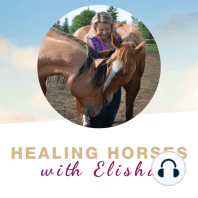20 min listen

17: Protein Deficiencies in Horses: Signs, Symptoms, and Causes
17: Protein Deficiencies in Horses: Signs, Symptoms, and Causes
ratings:
Length:
23 minutes
Released:
Jan 30, 2024
Format:
Podcast episode
Description
Today, we follow on from our last episode, where we spoke about feeding horses alfalfa. In this episode, we focus on protein deficiencies. To assess how effective a horse's diet is, owners need to identify and recognize any nutritional imbalances. In today's discussion, we explore the signs, symptoms, and underlying causes of those imbalances.Horses Need ProteinEven though horses are herbivores, they still require protein because it is the building block for their muscle development and repair. Signs of Protein Deficiencies in HorsesProtein deficiencies can lead to visible symptoms like poor appetite, slow growth, weight loss, hair loss, and increased incidence of physical injuries.How Protein Deficiency Impacts Vital OrgansHorses with protein deficiencies show subtle yet critical signs that need careful consideration. Horse bodies prioritize providing amino acids to vital organs like the heart and liver, making their connective tissues susceptible. So, owners must recognize those symptoms early and correct the imbalances before they impact the vital organs.A Comprehensive Profile of Protein Deficiency SymptomsBeyond common signs like poor appetite and weight loss, the symptoms of protein deficiency include slow growth rates, lackluster hair coats, increased susceptibility to injury, mental focus issues, depression, and hoof problems. Protein deficiencies can also compromise immune function, leading to frequent infections and allergies.Case Study of Protein Deficiency In a case study, a 20-year-old horse experienced declined health, with symptoms like bumps on the body, deteriorating body condition, laminitis, and goopy eyes. Despite a seemingly ideal lifestyle and care, its health was deteriorating. The owner suspected Cushing's disease. However, a closer look revealed symptoms consistent with protein deficiency, like weakened connective tissues, depression, fatigue, and poor immune function. The owner fed it a gradually increasing quantity of alfalfa to address the protein deficiency and saw positive changes, including improved energy levels, enhanced muscle tone, disappearance of skin bumps, and reduced eye discharge, and the horse regained vitality. The Causes of Protein DeficiencyVarious factors may contribute to protein deficiencies in horses. They include poor pasture quality, limited access to forage, and heightened protein requirements for specific groups. It is also essential to consider whether digestive problems or medications affect how well the horse's body utilizes amino acids.Keeping Horses HealthyIt is essential to understand each horse's unique nutritional needs. Owners can play a vital role in enhancing their horse's overall health by including protein-rich feeds like alfalfa and customizing their diets to meet the horse's specific nutritional requirements. Early recognition and correction of protein deficiencies are the key to ensuring that horses maintain their vitality, as that lays the foundation for their overall well-being. Links and resources:Connect with Elisha Edwards on her website Free Webinar Masterclass: Four Steps to Solving Equine Metabolic Syndrome NaturallyJoin my email list to be notified about new podcast releases and upcoming webinars.Mentioned in this episode:Learn the 4 Steps to Resolving Metabolic Syndrome NaturallySign up for the FREE...
Released:
Jan 30, 2024
Format:
Podcast episode
Titles in the series (32)
03: Feeding Horses Beet Pulp - the Myths and Facts by Healing Horses with Elisha